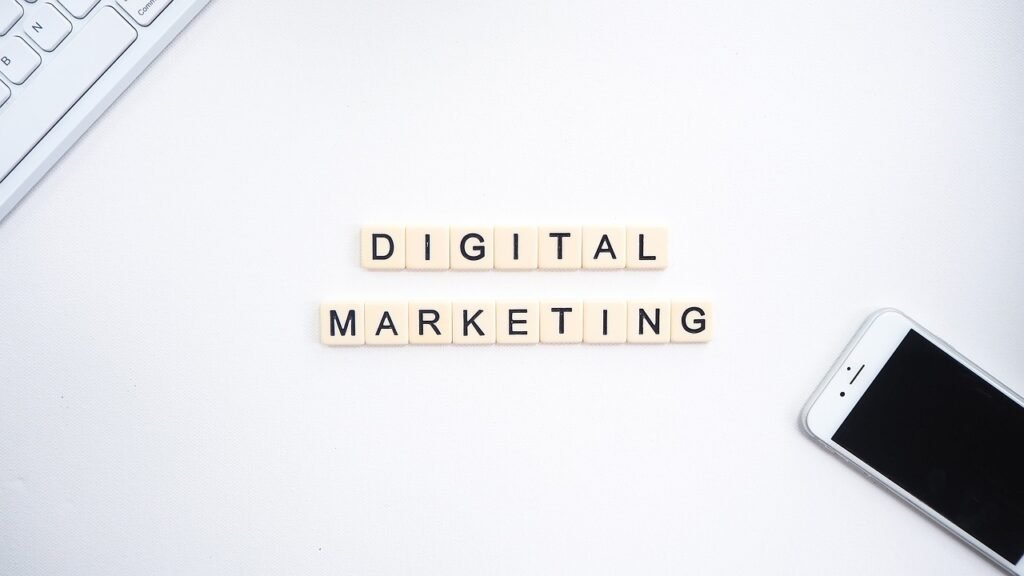BEST DIGITAL MARKETING COURSE SCOPE AND SALARY
Why go with Digital Marketing?
Early career professionals who wish to advance their knowledge of digital and social media marketing will find the course on digital marketing to be beneficial. Thanks to their newfound knowledge, they will be better equipped to plan, carry out, and evaluate a digital growth strategy to create leads and increase revenue.

Course in Digital Marketing:
The length of the training varies based on the level of digital marketing. The initial 3-4-month curriculum for the basic course is scheduled. The duration of the advanced courses may be 5-6 months. Those who wish to specialize in digital marketing might enroll in certain courses. These courses take up to 12 months and cover Digital Marketing.
1. Digital Marketing Overview:
Brands are promoted to engage with potential customers over the Internet and other digital media through digital marketing, often known as online marketing. This category includes email, web-based, social media, and multimedia messaging as well as text and other marketing methods.

2. Market Research and Analysis:
Many experts gain fresh perspectives and clarity about your firm from market research analytics. The systematic method of gathering, processing, analyzing, and assessing data about a particular market, industry, or business environment is known as market research analysis. Gaining an understanding of the market’s many facets, such as customer behavior, market trends, and the competitive environment, is its main goal.
3. Website Creation and Planning:
The initial stage of the development process for a website is planning. To decide on a website’s goal, style, and functional elements as well as the cost to develop and manage it, it acts as a platform for idea exchange. To ascertain the kind and particulars of the website that a business plans to develop requires documentation and strategic thought.
Get a quote
4. Search Engine Optimization (SEO):
To improve your website for Google, Microsoft Bing, and other search engines is known as search engine optimization (SEO). Helping search engines comprehend your content assisting visitors in finding your website and deciding whether or not to visit it through a search engine are the two main goals of search engine optimization.
5. Google Search Console Tool (GSC):
You may assess the performance and traffic to your website with Search Console’s tools and reports, address problems, and optimize your website to rank well in Google Search results. Review how your site is performing on Google, Submit sitemaps, and individual URLs for crawling, and identify technical SEO errors.
6. Google Analytics:
The steps to create an account, apply tracking codes, and configure data filters are all explained by Google Analytics. You will get knowledge on utilizing the Google Analytics interface, reports, dashboard configuration, and shortcut creation.
7. Social Media Marketing:
The practice of using social media platforms where users create social networks and exchange information to promote a business, boost sales, and improve website traffic is known as social media marketing. To do this, you must post excellent material on your social media pages, interact with and listen to your followers, evaluate your performance, and conduct social media ads. Businesses of all sizes may effectively contact prospects and consumers with social media marketing.
8. E-Commerce Marketing:
Online customers are guided through several processes by means of e-commerce marketing. E-commerce marketing is the act of increasing online store visibility and traffic while turning website users into devoted patrons. E-commerce brands can increase sales, enhance client retention, and raise brand exposure by utilizing channels such as email, social media, and SEO.
9. Google AdWord:
Advertising companies can place their adverts on Google’s search engine results page by using the pay-per-click internet advertising network Google AdWords. Businesses bid to have their ads appear at the top of the search results page based on the keywords they wish to target. Similar to an auction, clicks on the Google AdWords marketplace are bid upon. Still, the highest bid doesn’t need to prevail. To guarantee the greatest experience for users who click on the adverts, Google takes quality score into account in addition to money.
10. Mobile Marketing:
Mobile marketing refers to any form of advertising that uses mobile devices, like tablets and smartphones, to promote goods and services. It utilizes contemporary mobile technology features, such as location services. The majority of people always carry their phones with them, which enables them to communicate with clients instantly.
11. Online Bidding and Freelancing Overview:
Freelancing is comparable to other traditional jobs. You can work at any time and from any location. It’s not just about pricing while bidding. Cost is the last consideration. Bidding on jobs through social media platforms entails putting in a bid to a client who has placed a job. Your proposal needs to highlight your qualifications and experience. It is your duty as a freelancer to carefully read the job advertisement, assess whether it fits with your skills, and draft a proposal that satisfies your requirements.
12. Blogging:
Developing and running a blog on the internet is called blogging. Creating articles, photos, and other kinds of content is part of it. To accomplish their digital marketing objectives, a lot of firms these days have blogs on their websites. A blog is an informational website that is updated regularly or regularly and can contain news, diaries, or journals. You can use a blog as a way to communicate with and educate your online audience by sharing information.
13. Google AdSense:
Google AdSense gives publishers a means of generating revenue from their web content. Based on your website’s content and visitors, AdSense matches adverts to your website. Advertisers who wish to promote their products develop and fund the advertisements. An easy and free approach to making money online is to place adverts next to your content using AdSense.
14. Affiliate Marketing:
With affiliate marketing, a business pays independent publishers to drive customers to its website or open doors for them to use its goods and services. Their incentive to find ways to market the company comes from the commission charge. A website owner or YouTuber who is an affiliate promotes a company’s products or services to help it reach its marketing or sales goals. Affiliate marketing is a revenue-sharing marketing strategy. Affiliates receive a cut of any sales or client traffic brought about by their marketing initiatives in exchange.
15. Content Marketing:
Producing and sharing relevant articles, videos, podcasts, and other material is known as content marketing, and it is a marketing strategy used to attract, engage, and expand an audience. Content marketing is a marketing strategy that involves producing and disseminating online content that aims to entice readers to visit a brand’s website, rather than just promoting it. Information sharing and narrative techniques raise brand recognition.
16. Online Reputation Management (ORM):
Improving a company’s or brand’s public perception is the primary objective of online reputation management or Online Reputation Management. Every action a brand takes should be continuously monitored and managed to assist shape the perceptions of both present and potential customers and portray a trustworthy and dependable image of the firm. Monitoring and shaping online perceptions of your business to dispel negative perceptions and promote positive ones is known as internet reputation management. aids in boosting revenue, visibility, authority, and credibility, building trust, and improving brand perception.
17. Video Marketing:
Video marketing is the process of using video material to educate or market your business and products to audiences. We’ll explain the fundamentals of video marketing and its advantages for your brand in this tutorial. We’ll also provide you with an overview of the Amazon Ads options available to you as you begin developing your video marketing plan.
18. Advance Affiliate Marketing:
A third-party publisher promotes a merchant’s products or services in exchange for a cut of any purchases or website traffic generated through affiliate marketing. In contemporary Digital Marketing, it is usually seen as an essential component. Businesses are drawn to affiliate marketing since it helps them achieve their marketing objectives and gives affiliates the chance to earn passive money.
Digital Marketing Salary:
Working in digital marketing pays well. The average monthly base income for digital marketers is ₹25,865, with the range increasing to ₹5,855 – ₹96,542 with additional compensation in the form of commissions, cash incentives, and profit sharing.

